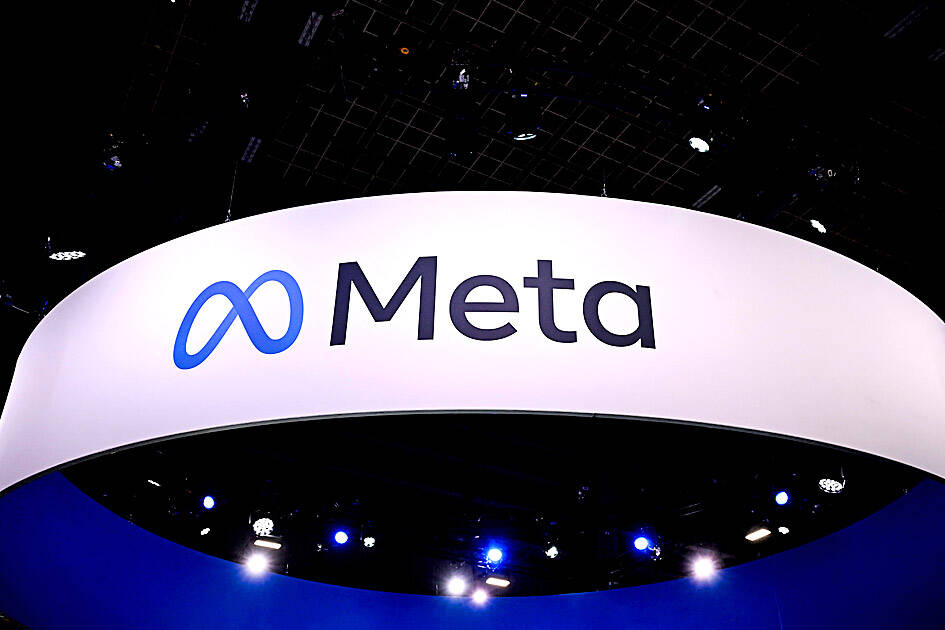Meta Platforms Inc on Friday provided a look at a generative artificial intelligence (AI) model it is working on that lets people create short videos, complete with audio, from text prompts and photos.
The tech titan touted “Meta Movie Gen” as a “breakthrough” when it comes to using an AI engine to produce video and audio.
Meta said it would seek feedback from filmmakers and creators as it eases toward making the video-generating AI engine publicly available.

Photo: AFP
No release plans for Movie Gen were disclosed.
“While there are many exciting use cases for these foundation models, it’s important to note that generative AI isn’t a replacement for the work of artists and animators,” Meta said in a post.
The model lets people use text prompts to create custom videos, including clips based on people’s photos, of up to 16 seconds long, the company said.
“Our model achieves state-of-the-art results when it comes to creating personalized videos that preserve human identity and motion,” Meta said.
“Imagine animating a ‘day in the life’ video to share on Reels and editing it using text prompts or creating a customized animated birthday greeting for a friend and sending it to them on WhatsApp.”
Movie Gen is the third wave of AI-powered video generation at Meta, the company said.
Meta is one of multiple major tech companies developing AI models focused on generating videos, which are more complicated and expensive to build than those that return AI-generated text.
Microsoft Corp-backed OpenAI has its own video generation tool, called Sora, that debuted earlier this year and can create videos up to a minute in length, although that technology is not available to the public yet. DeepMind, a subsidiary of Alphabet Inc’s Google, also has a video generation tool, called Veo, which was unveiled earlier this year.
However, the rise of AI tools for creating realistic videos has prompted worries about “deepfakes” that pirate people’s likenesses.

When an apartment comes up for rent in Germany’s big cities, hundreds of prospective tenants often queue down the street to view it, but the acute shortage of affordable housing is getting scant attention ahead of today’s snap general election. “Housing is one of the main problems for people, but nobody talks about it, nobody takes it seriously,” said Andreas Ibel, president of Build Europe, an association representing housing developers. Migration and the sluggish economy top the list of voters’ concerns, but analysts say housing policy fails to break through as returns on investment take time to register, making the

‘SILVER LINING’: Although the news caused TSMC to fall on the local market, an analyst said that as tariffs are not set to go into effect until April, there is still time for negotiations US President Donald Trump on Tuesday said that he would likely impose tariffs on semiconductor, automobile and pharmaceutical imports of about 25 percent, with an announcement coming as soon as April 2 in a move that would represent a dramatic widening of the US leader’s trade war. “I probably will tell you that on April 2, but it’ll be in the neighborhood of 25 percent,” Trump told reporters at his Mar-a-Lago club when asked about his plan for auto tariffs. Asked about similar levies on pharmaceutical drugs and semiconductors, the president said that “it’ll be 25 percent and higher, and it’ll

NOT TO WORRY: Some people are concerned funds might continue moving out of the country, but the central bank said financial account outflows are not unusual in Taiwan Taiwan’s outbound investments hit a new high last year due to investments made by contract chipmaker Taiwan Semiconductor Manufacturing Co (TSMC, 台積電) and other major manufacturers to boost global expansion, the central bank said on Thursday. The net increase in outbound investments last year reached a record US$21.05 billion, while the net increase in outbound investments by Taiwanese residents reached a record US$31.98 billion, central bank data showed. Chen Fei-wen (陳斐紋), deputy director of the central bank’s Department of Economic Research, said the increase was largely due to TSMC’s efforts to expand production in the US and Japan. Investments by Vanguard International

WARNING SHOT: The US president has threatened to impose 25 percent tariffs on all imported vehicles, and similar or higher duties on pharmaceuticals and semiconductors US President Donald Trump on Wednesday suggested that a trade deal with China was “possible” — a key target in the US leader’s tariffs policy. The US in 2020 had already agreed to “a great trade deal with China” and a new deal was “possible,” Trump said. Trump said he expected Chinese President Xi Jinping (習近平) to visit the US, without giving a timeline for his trip. Trump also said that he was talking to China about TikTok, as the US seeks to broker a sale of the popular app owned by Chinese firm ByteDance Ltd (字節跳動). Trump last week said that he had